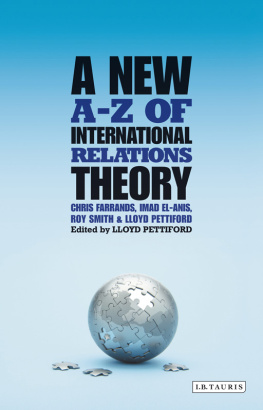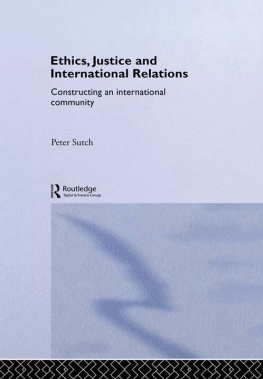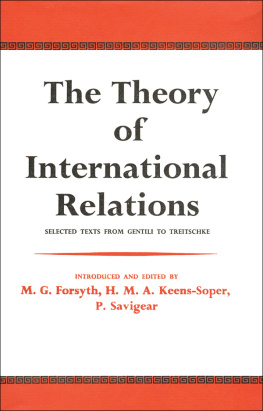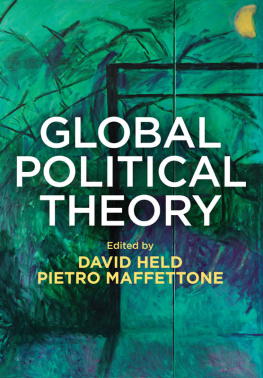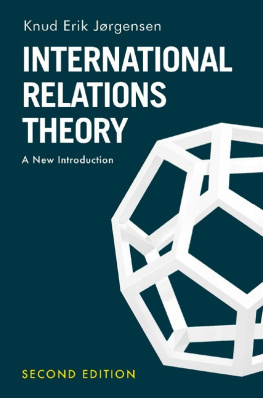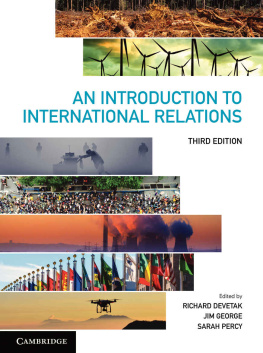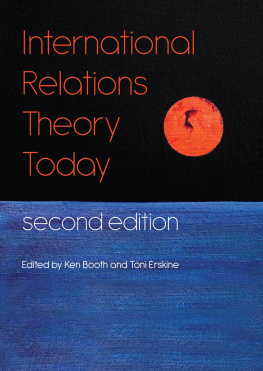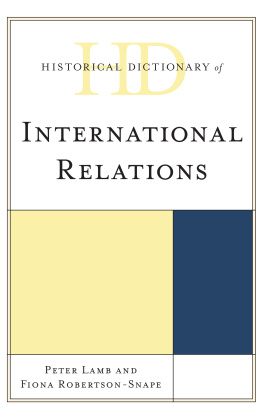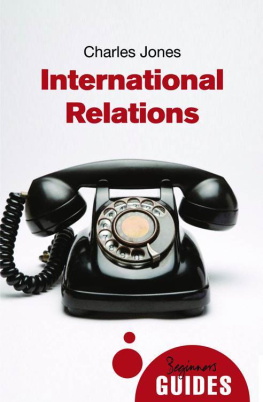Chris Farrands is Principal Lecturer in International Relations at Nottingham Trent University, and the author or editor of a wide range of books and articles on international relations and IPE, most recently (co-edited with Cerwyn Moore) International Relations Theory and Philosophy: Interpretive Dialogues (2010).
Imad El-Anis is Senior Lecturer in International Relations at Nottingham Trent University. He is co-author (with Roy Smith and Chris Farrands) of International Political Economy in the 21st Century: Contemporary Issues and Analyses (2010) and a contributor to An Introduction to International Relations Theory: Perspectives and Themes (3rd edition, 2010).
Roy Smith is Principal Lecturer in International Relations at Nottingham Trent University. He is co-author (with Imad El-Anis and Chris Farrands) of International Political Economy in the 21st Century: Contemporary Issues and Analyses (2010).
Lloyd Pettiford is Professor of International Relations and Associate Dean of the School of Arts and Humanities at Nottingham Trent University. He is co-author of An Introduction to International Relations Theory: Perspectives and Themes (3rd edition, 2010).
This is an encompassing and wonderful effort to look at International Relations, not as an isolated discipline with unique technical terms that give rise to a compartmentalised technical virtuosity but as something that opens onto, just as it has absorbed from, the wider world and its varied histories. It is different from other such dictionaries and is a much grander intellectual effort. International Relations finally becomes part of a complex historical sociology of knowledge.
Stephen Chan, Professor of International Relations, SOAS
Very well written and cogently argued ... it will undoubtedly appeal to an undergraduate and postgraduate audience, as well as their teachers, especially with the continuing preoccupation with theory in all major courses.
Professor Jack Spence OBE, Department of War Studies, Kings College London
Published in 2015 by
I.B.Tauris & Co. Ltd
London New York
www.ibtauris.com
Copyright 2015 Chris Farrands, Imad El-Anis, Roy Smith and Lloyd Pettiford.
The right of Chris Farrands, Imad El-Anis, Roy Smith and Lloyd Pettiford to be identified as the authors of this work has been asserted by them in accordance with the Copyright, Designs and Patents Act 1988.
All rights reserved. Except for brief quotations in a review, this book, or any part thereof, may not be reproduced, stored in or introduced into a retrieval system, or transmitted, in any form or by any means, electronic, mechanical, photocopying, recording or otherwise, without the prior written permission of the publisher.
Library of International Relations 63
ISBN: 978 1 84885 501 4 (HB)
978 1 84885 502 1 (PB)
eISBN: 978 0 85773 991 9
A full CIP record for this book is available from the British Library
A full CIP record is available from the Library of Congress
Library of Congress Catalog Card Number: available
Typeset in Minion
Introduction
At first sight, to write a dictionary entry seems easy. You write on a specific topic, often a mere single word that you know something about, looking up what you are not sure of, and checking what you thought you knew. But as you move from one single entry to the whole dictionary project, the enormous ambition of the whole idea becomes clear. A dictionary captures a whole field. It claims to have grasped the vocabulary of that field, but the language of a field of study does not just reflect it it creates it, manipulates it, reflects dominant ideas and offers the possibility at the same time of ways of expressing resistance to those dominant ideas. Language defines and limits any area of life, including, of course, academic study and research. True, this New AZ of International Relations Theory is not like the great dictionaries and encyclopaedias of the eighteenth century, which attempted to set out the whole of then-existing human knowledge. It has much narrower objectives. But even so, to try to grasp the whole of a complex field as it changes day by day is surely more than ambitious: it is arrogance.
The authors of this dictionary do not, of course, fully share these views. But they are well aware that we live in an era of uncertainty and anxiety, of rapid change in many aspects of global politics, of the shift of power around the world system, the rise of new agendas, the spread of new forms of conflict and violence, and of shifts in the underlying patterns of beliefs and values. In this setting, to try to fix the vocabulary of a subject in a text that claims some kind of authority is very difficult. What Zygmunt Bauman () has called liquid modernity is not easily pinned down. When things change faster, language changes more rapidly, and whether or not they are actually changing as fast as Bauman suggests, language, including the language of international relations, is changing fast enough to make his case more convincing. At the same time, we would argue that it is all the more important to study International Relations, and all the more important to have a sophisticated vocabulary to do this. If studying IR in a complex world is difficult, students all the more need what support different tools can give them.
An up-to-date dictionary which recognizes these changes, and the diversity of the world around us, is therefore all the more valuable. But this is not a dictionary of IR; it is a dictionary of IR theory. It is designed to help students at any level find their way through the thickets and difficulties of the subject, to be more than a friendly guide when you start the subject and need to acquire the vocabulary quickly to be able to work in the field, and then to be a work of useful reference which you will draw on throughout your study of the subject, whether that is for one year on an MA or over the three or four years of a degree programme. Theory does always relate to practice, to the world of our experience, although the relationship may sometimes be elusive. But since theory is the way in which we make sense of a field of study, it is an essential entry point to the study of the subject as a whole.
A conventional lexical dictionary has two main choices. It can present a normative account of language, as many used to do: this is what this word should mean or this is how that word should be used in polite or educated or civilized company. Or it can be descriptive, setting out how language is actually used by the whole community of those to whom it belongs. The editors of both the leading English language dictionaries, the Oxford English Dictionary in the UK and the US Websters English Dictionary, have long aimed to describe current language use as accurately as possible as it evolved, reflecting current practices in the uses of words and the construction of meanings across the Anglo-Saxon world. But even so, this has often produced howls of anguish from those who would keep slang out of dictionaries, who protested furiously at the inclusion of the everyday swear words that we well, nearly all of us use all the time, and who felt unable to recognize the peculiar diversities of modern English, including Indian, Caribbean and American versions, web jargon and textese, scientific specialist vocabularies, regional dialect, street slangs and creoles. These questions about the recognition of diversities of language use are also about power. They are about who defines what counts, and what is excluded. And they are, in fact, questions of international relations as well as inter-cultural relations. In the same way that anyone compiling an English dictionary has to ask Whose English?, so the choice of entries in an IR dictionary has to ask Whose IR? Theory is not a fixed body of knowledge, but it is also not neutral, either in the face of the realities and conflicts in the world, or in the face of academic debates about the scope and nature and purpose of studying the subject at all. It is highly contentious in its boundaries and methods, in its attempts to be critical critical of what and in what ways? To represent the field as a stable system of agreed ideas would be totally misleading. But equally, there are some powerfully persistent ideas within the field; and there are some arguments which have an important claim on our attention albeit perhaps our critical attention because they have had such an enduring presence in debates about the international realm.

